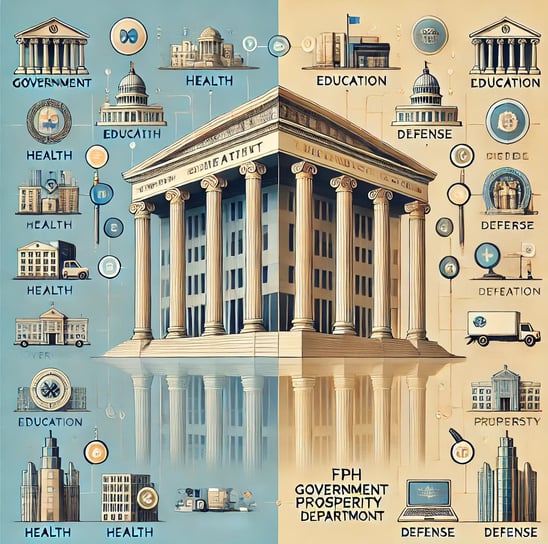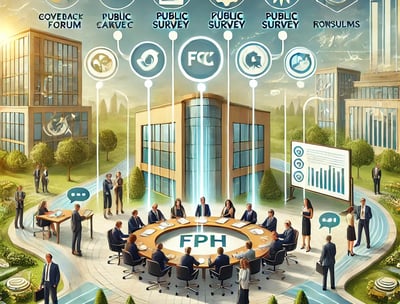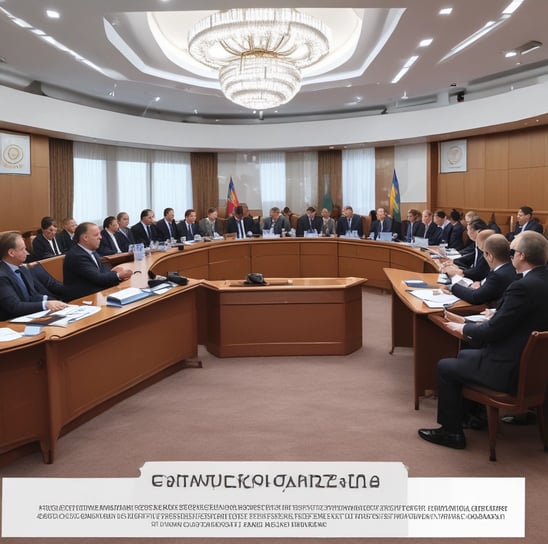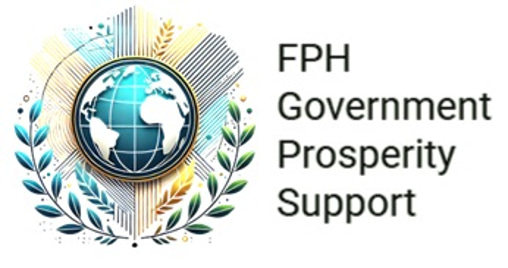
Strategic Framework for Ministerial Alignment
Mirrored Governance: Structural Alignment Between Government Ministries and the FPH Government Prosperity Support Department
Government and Future Progress Holding (FPH)
Government Prosperity Support Department
To support national prosperity and economic advancement, Future Progress Holding (FPH) has established the Government Prosperity Support Department—a structured division that mirrors the governmental organization of Moldova. This parallel structure is designed to facilitate seamless collaboration, enhance policy implementation, and mobilize private sector capabilities in alignment with national priorities.
The following framework outlines the 15 core ministries, their associated industries, and the corresponding FPH departments, ensuring strategic integration and comprehensive sectoral support.
Below is a professional alignment of Moldova’s 14 Government Ministries with the corresponding Departments of the FPH Government Prosperity Support, ensuring mirrored governance and structural harmony. Additionally, I’ve proposed a 15th FPH Department to maintain the 15–15 balance, serving a strategic function not covered directly by a specific ministry.


1. Executive Summary
This proposal introduces the "Mirrored Governance" framework, a strategic model for structural alignment between the 15 Ministries of the Government of the Republic of Moldova and the 15 Departments of the FPH Government Prosperity Support Division. The aim is to establish a harmonized and collaborative governance ecosystem that promotes national prosperity, operational efficiency, and public-private synergy.
Through a one-to-one structural mirror, each FPH Department will align its functions with a corresponding Government Ministry, facilitating seamless coordination, policy implementation, and resource optimization. This alignment supports Moldova’s goals for sustainable development, digital transformation, economic growth, and social inclusion, while leveraging FPH's innovation capacity and strategic resources.


Mirrored Governance: The Shared Structural Framework of Government Ministries and the FPH Government Prosperity Support Department. 15 departments and 15 ministeriums
Mirrored Governance represents a pioneering approach to administrative alignment between public governance and private sector prosperity initiatives. By establishing a shared structural framework of 15 Government Ministries and 15 corresponding Departments within the FPH Government Prosperity Support Department, this model fosters seamless collaboration, strategic synergy, and operational efficiency across both sectors.
1. FPH Department of International Relations and Strategic Partnerships
Ministry of Foreign Affairs and European Integration
Industries: Diplomacy, Trade Relations, International Law, Global Logistics, Foreign Investment, Cross-border Cooperation
Key Functions:
Establish and maintain strategic international partnerships and trade agreements
Coordinate cross-border economic initiatives and joint ventures
Support foreign direct investment (FDI) and international funding access
Represent FPH interests in international forums, conferences, and diplomatic missions
Ensure compliance with international laws and trade standards


2. FPH Department of Internal Security and Institutional Support
Ministry of Internal Affairs
Industries: Civil Security, Public Safety, Law Enforcement Services, Emergency Management, Cybersecurity Infrastructure
Key Functions:
Develop and implement internal security protocols for FPH entities
Manage risk mitigation, emergency response plans, and business continuity
Collaborate with public authorities on civil safety and institutional protection
Oversee cybersecurity infrastructure and digital asset protection
Conduct regular audits on operational integrity and compliance
Ministry of Finance
Industries: Banking, Insurance, Investment Funds, Accounting Services, Fintech, Monetary Policy, Treasury Management
Key Functions:
Manage FPH’s financial planning, budgeting, and economic forecasting
Oversee treasury operations, liquidity management, and investment strategy
Coordinate financial reporting, auditing, and regulatory compliance
Engage in capital markets, asset management, and funding activities
Monitor global financial trends to ensure economic stability and growth
3. FPH Department of Financial Management and Economic Stability




4. FPH Department of Economic Development and Industry Support
Ministry of Economy
Industries: Manufacturing, Commerce, Industrial Parks, Business Services, Start-ups, SMEs, Trade Facilitation
Key Functions:
Promote industrial growth, entrepreneurship, and SME development
Facilitate public-private partnerships (PPPs) for infrastructure and industry
Develop policies for market expansion, trade facilitation, and competitiveness
Support innovation in traditional and emerging industries
Provide business advisory, incubation, and capacity-building services


5. FPH Department of Agriculture and Food Security
Ministry of Agriculture and Food Industry
Industries: Crop and Livestock Farming, AgriTech, Food Processing, Agricultural Exports, Rural Development
Key Functions:
Support sustainable agricultural practices and modern farming technologies
Ensure food security through logistics, supply chain management, and quality control
Promote agro-industry development and export competitiveness
Coordinate research in agri-tech and rural development initiatives
Provide support for cooperatives, farmers, and agri-business networks
Ministry of Infrastructure and Regional Development
Industries: Construction, Transportation (Road, Rail, Air), Urban Planning, Real Estate, Smart Cities, Regional Logistics
Key Functions:
Plan and implement infrastructure projects: transport, utilities, and public facilities
Oversee urban planning, smart city projects, and real estate development
Support public transit, logistics hubs, and regional development initiatives
Manage infrastructure funding, construction, and maintenance partnerships
Facilitate sustainable development through green infrastructure solutions
6. FPH Department of Infrastructure, Transport, and Urban Development




7. FPH Department of Legal Affairs and Compliance
Ministry of Justice
Industries: Legal Consultancy, Corporate Law, Arbitration, Intellectual Property, Regulatory Affairs, Risk Management
Key Functions:
Provide legal advisory and representation for FPH entities
Ensure regulatory compliance and risk mitigation across all operations
Manage intellectual property, contractual affairs, and dispute resolution
Draft, review, and negotiate domestic and international agreements
Promote ethical governance and adherence to global legal standards


8. FPH Department of Strategic Security and Resource Protection
Ministry of Defense
Industries: Defense Technologies, Private Security Services, Strategic Logistics, Cyber Defense, Emergency Resources
Key Functions:
Secure critical FPH assets, infrastructure, and supply chains
Develop strategic resource management and emergency preparedness plans
Coordinate private security services and strategic logistics support
Oversee resilience measures for geopolitical and environmental risks
Support cybersecurity and physical infrastructure protection protocols
Ministry of Education and Research
Industries: Academic Institutions, Vocational Training, E-Learning, Scientific Research, EdTech, Talent Development
Key Functions:
Develop educational programs aligned with industry needs and future skills
Support vocational training, e-learning platforms, and professional development
Fund and coordinate research projects, innovation labs, and think tanks
Collaborate with academic institutions for knowledge exchange and R&D
Promote talent development and leadership capacity across sectors
9. FPH Department of Education, Training, and Research Development




10. FPH Department of Public Health and Medical Services
Ministry of Health
Industries: Healthcare, Pharmaceuticals, Biotech, Medical Equipment, Telemedicine, Health Insurance
Key Functions:
Support healthcare delivery systems and public health initiatives
Coordinate with medical institutions, clinics, and telemedicine platforms
Manage pharmaceutical supply chains, biotech investments, and health tech
Promote wellness, preventative care, and occupational health services
Ensure compliance with health standards and regulations


11. FPH Department of Workforce Development and Social Welfare
Ministry of Labour and Social Protection
Industries: Employment Services, Social Programs, HR Services, Pension Funds, Social Impact Enterprises
Key Functions:
Facilitate job creation, employment services, and workforce mobility
Develop inclusive social welfare programs and community outreach
Manage pension, social insurance, and support for vulnerable groups
Promote corporate social responsibility (CSR) initiatives
Conduct labor market analysis and policy development
Ministry of Culture
Industries: Creative Arts, Media, Publishing, Entertainment, Cultural Tourism, Event Management
Key Functions:
Promote creative industries, cultural events, and artistic endeavours
Preserve and restore cultural heritage and historical sites
Support media, publishing, and entertainment industry development
Coordinate cultural diplomacy and international cultural exchanges
Foster innovation in arts through technology and funding
12. FPH Department of Culture, Arts, and Heritage Preservation




13. FPH Department of Environmental Sustainability and Green Development
Ministry of Environment
Industries: Renewable Energy, Waste Management, Environmental Consulting, Water Management, Eco-Tourism
Key Functions:
Develop and implement sustainability initiatives and green policies
Promote renewable energy, waste management, and eco-friendly solutions
Coordinate environmental impact assessments and conservation projects
Support climate change mitigation and adaptation strategies
Facilitate green investments and eco-innovation platforms


14. FPH Department of Energy Resources and Sustainability
Ministry of Energy
Industries: Energy Production, Oil & Gas, Renewable Energy, Energy Infrastructure, Energy Trading, Smart Grids
Key Functions:
Oversee energy production, distribution, and infrastructure development
Promote renewable energy sources: solar, wind, hydro, and bioenergy
Manage energy trading, efficiency programs, and smart grid initiatives
Ensure energy security and sustainability of resources
Facilitate partnerships in energy innovation and clean technology
(FPH Only)
Industries: Information Technology, Software Development, AI & Automation, Blockchain, Digital Services, Startups
Key Functions:
Drive digital transformation, IT solutions, and technological innovation
Support startups, tech hubs, and digital entrepreneurship ecosystems
Coordinate blockchain, AI, and automation integration across sectors
Develop digital infrastructure, e-government services, and data platforms
Foster global competitiveness through tech adoption and R&D
15. FPH Department of Innovation and Digital Economy




Empowering Growth Through Strategic Governance
This mirrored structure ensures comprehensive governance support through specialized departments, offering strategic guidance, operational capacity, and a foundation for sustainable growth, innovation, and prosperity in both the public and private sectors.


Empowering Structural Alignment for Success
We drive operational synergy and innovation across sectors, enhancing global competitiveness through strategic collaboration and harmonized structures.
Key Benefits of Structural Alignment:
Operational Synergy: Clear mirroring facilitates public-private cooperation.
Strategic Coverage: All major economic sectors are supported.
Efficiency and Innovation: Cross-sectoral collaboration enhances policy execution and innovation.
Global Competitiveness: Harmonized structures attract international partnerships and investments.
Key Benefits and Strategic Impact
Public-Private Synergy: Promotes efficient collaboration and knowledge exchange between governmental bodies and FPH experts.
Operational Efficiency: Streamlines workflows, reduces duplication, and accelerates project delivery.
Sustainable Development: Supports Moldova’s economic, environmental, and social development goals.
Innovation & Digitalization: Accelerates the adoption of cutting-edge technologies and digital solutions.
Resource Optimization: Enhances financial management, human resource deployment, and infrastructure utilization.


Implementation Plan
The structured implementation of this plan ensures seamless collaboration, measurable outcomes, and sustainable impact, driving Moldova’s progress through an aligned public-private governance model focused on efficiency, innovation, and prosperity.
Phase 1: Planning and Coordination (Months 1-3)


Establishment of joint coordination taskforces for each ministry-department pair.
Definition of key performance indicators (KPIs) and strategic goals.
Legal framework review and MoU (Memorandum of Understanding) development.




Phase 2: Operational Alignment (Months 4-9)
Synchronization of operational protocols and reporting mechanisms.
Launch of pilot initiatives in priority sectors (e.g., digital transformation, public health, education).
Training and capacity-building workshops for public and FPH staff.
Full-scale implementation across all departments and ministries.
Monitoring and evaluation (M&E) using predefined KPIs.
Continuous improvement loop based on feedback and performance.
Phase 3: Full Deployment and Evaluation (Months 10-18)
Monitoring & Evaluation Framework
The structured implementation of this plan ensures seamless collaboration, measurable outcomes, and sustainable impact, driving Moldova’s progress through an aligned public-private governance model focused on efficiency, innovation, and prosperity.
Key Metrics:


Project delivery time,
Budget efficiency,
Public satisfaction,
Cross-sector collaboration outcomes.




Reporting Mechanism:
Quarterly reports to the Government and FPH Board,
Annual strategic review.
Stakeholder consultations,
Public surveys,
Internal audits.
Feedback Channels
Innovative Governance for Moldova's Future
We unite Moldova's public institutions with strategic capabilities to foster development, innovation, and global competitiveness through a mirrored governance model.
The Mirrored Governance model represents a visionary approach to modern governance, combining the strengths of Moldova’s public institutions with FPH’s strategic capabilities. By fostering structural alignment, Moldova positions itself for accelerated development, innovation leadership, and enhanced global competitiveness. This proposal seeks governmental endorsement to initiate formal collaboration and begin structured implementation.


936+
150
Trusted by Leaders
Proven Success
Collaboration
Fostering global partnerships for economic development.
Innovation
Sustainability
+41798400682
© 2024. All rights reserved.
